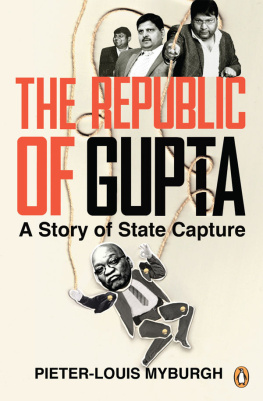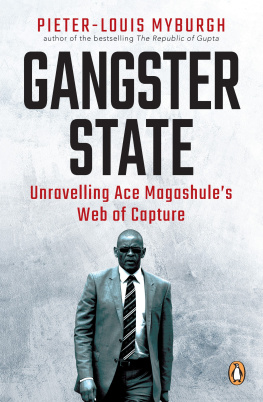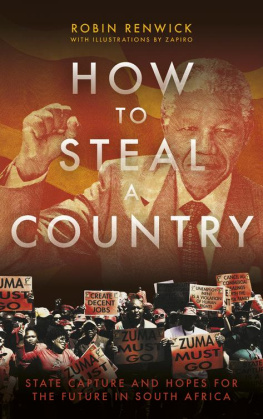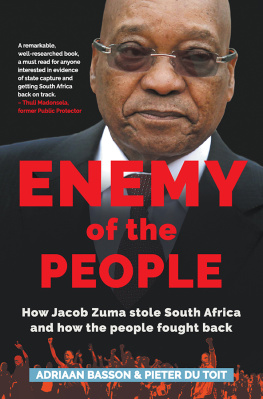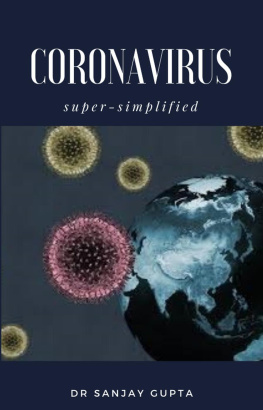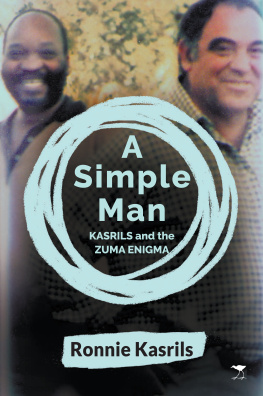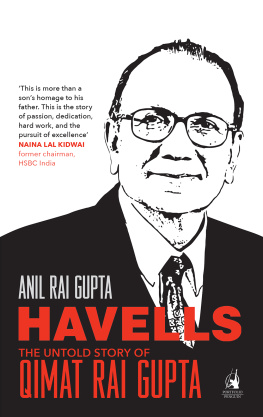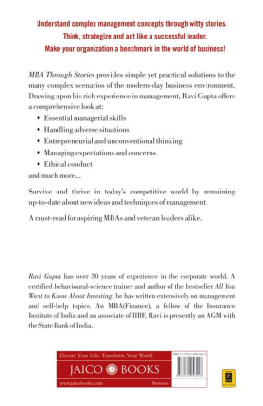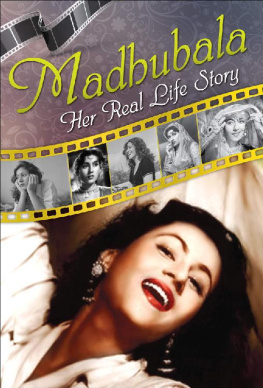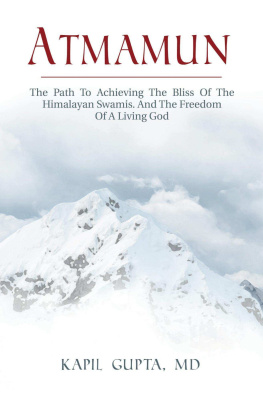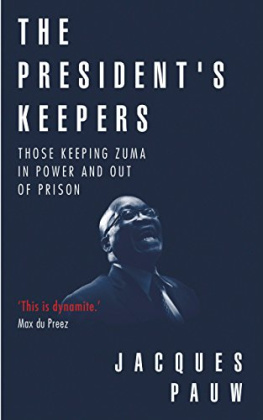
Published by Penguin Books
an imprint of Penguin Random House South Africa (Pty) Ltd
Reg. No. 1953/000441/07
The Estuaries No. 4, Oxbow Crescent, Century Avenue, Century City, 7441
PO Box 1144, Cape Town, 8000, South Africa
www.penguinrandomhouse.co.za

First published 2017
Publication Penguin Random House 2017
Text Pieter-Louis Myburgh 2017
Cover photographs: Atul and Ajay Gupta Martin Rhodes/Business Day;
Jacob Zuma Reuters/Mike Hutchings
Author photo: Felix Dlangamandla
All rights reserved. No part of this publication may be reproduced,
stored in a retrieval system or transmitted, in any form or by any means,
electronic, mechanical, photocopying, recording or otherwise,
without the prior written permission of the copyright owners.
PUBLISHER : Marlene Fryer
MANAGING EDITOR : Robert Plummer
EDITOR : Bronwen Maynier
PROOFREADER : Lisa Compton
COVER DESIGNER : Gretchen van der Byl
TEXT DESIGNER : Ryan Africa
INDEXER : Sanet le Roux
ISBN 978 1 77609 089 1 (print)
ISBN 978 1 77609 090 7 (ePub)
For Zelda, my fortress
The appearance of the law must be upheld.
Especially while its being broken.
William Magear Tweed, Gangs of New York
Contents
Preface
When I learnt in the latter half of 2015 that the publishing of The Republic of Gupta would become a reality, I was filled with a great deal of excitement. As a journalist, I had become well accustomed to the confines ones words are subjected to when writing for newspapers or even online platforms. Finally, I thought, here is an opportunity to let rip on the wonderfully expansive canvas that is a 300-page book.
But soon, dark blots of trepidation began to mix with my excitement. What if the subject matter simply did not yield enough material to fill the pages? And were the Guptas really interesting enough to justify spending over a year researching and writing about them?
Despite being plagued by apprehensions, I got on with the task. My progress, frankly, was not the result of some noble display of internal strength. It was deadline-related paranoia that whipped me to the finish line. Much has been said about what inspires people to write, but the procrastinating author knows the deadline to be his or her cruellest master and most effective motivator.
And so it came to be that my earliest sentences grew into paragraphs, and paragraphs into chapters. As this book began to take shape, I realised that my initial fears over the subject matter were unfounded. In fact, it quickly became clear to me that there were more than enough issues pertaining to South Africas most infamous business family that I could write about. This became particularly evident from March 2016 onwards, when the proverbial dam wall broke regarding the Guptas influence over government affairs.
The challenge, it seemed, would rather be deciding what to include and what to leave out. In this regard, The Republic of Gupta seeks to unpack the most important developments involving the family. It is not intended to be a blow-by-blow summary of every single news event featuring them and their business empire. Instead, I have accompanied my discussion of the more pertinent Gupta-related news events with an in-depth exploration of other issues that did not find their way onto the front pages of newspapers. By combining the two approaches, I hope to give readers a broad yet thorough account of who the Guptas really are.
As I write this, the Guptas are very much a developing news story. New revelations and information about the familys doings have made their way into the press on an almost weekly basis since the start of 2016. This has made writing The Republic of Gupta somewhat tricky. I am well aware that relevant Gupta-related issues will surface after this book goes to print. Perhaps one day, when it appears that the Gupta saga has finally reached its conclusion, I might be tempted to write a sequel to the story.
During the process of sourcing new information on the family, I met with several individuals whose identities cannot be disclosed. The use of unnamed sources in journalism is at once indispensable and problematic. On the one hand, people often have legitimate concerns over their personal safety when divulging sensitive information that has a bearing on the rich and powerful. It goes without saying that such sources need to be protected at all costs. On the other hand, the use of unnamed sources raises concerns over the credibility of the information they provide. For this reason, it is of the utmost importance to determine the veracity of such information before it is stated as fact. Where it is not possible to do so, the journalist needs to consider carefully whether such unverified information should be made public at all. At the very least, unproved claims should be clearly labelled as being just that. This is a good ethos to be guided by while writing about a topic as controversial as the one tackled in The Republic of Gupt a . I hope I have succeeded in doing so.
One of the people I met during my research is a former politician who had close ties with the Guptas. At one point during our conversation, I became the interviewee. The former politician wanted to know why I had decided to focus specifically on the Guptas. There are many other businesspeople who abuse their close ties with government officials for personal gain, he told me; why not focus on them too?
It was a fair question. President Jacob Zuma alone is closely linked to a wide network of tender moguls who seem to be disproportionately successful when it comes to securing big government contracts. There are many other senior government officials who maintain similar relationships with people in the private sector. Given Zumas questionable stance on the bond between his party and those doing business with the state, it is no wonder that this symbiosis has become increasingly predatory in nature during his tenure as president.
It was Zuma, after all, who in 2013 told guests at the 101st anniversary gala dinner of the African National Congress (ANC) that a wise businessperson will support the ANC because supporting the ANC means youre investing very well in your business.
When he revisited the same topic in a speech at a dinner hosted by the ANCs Progressive Business Forum in October 2015, Zumas message had morphed into something that was at once desperate and menacing. I always say to business people that if you invest in the ANC, you are wise. If you dont invest in the ANC, your business is in danger, he reportedly told the audience.
But it is not only Zumas closest business buddies who have responded to the presidents invitation with enthusiasm. There must be hundreds, if not thousands, of businesspeople who have positioned themselves to repeatedly benefit from state expenditure at every level of government. This includes national and provincial departments, state-owned entities, as well as provincial and municipal authorities.
What the former politician did not acknowledge, however, was the exceptional proximity to and influence over the highest echelons of government that the Guptas have apparently been allowed to establish. This sets them apart from other politically connected players in South Africas business fraternity. There is no doubt in my mind that we are mostly in the dark about the shady dealings of some of these other tender barons, but the fact that we have been hearing so many tales of government officials being summoned to the Guptas infamous Saxonwold estate suggests that the family has been exceedingly more aggressive in their lobbying efforts. It is for these reasons that the term state capture has become synonymous with the Guptas, and why a book such as this one would necessarily explore the issue of state capture by means of honing in on the Guptas exploits.
Next page
